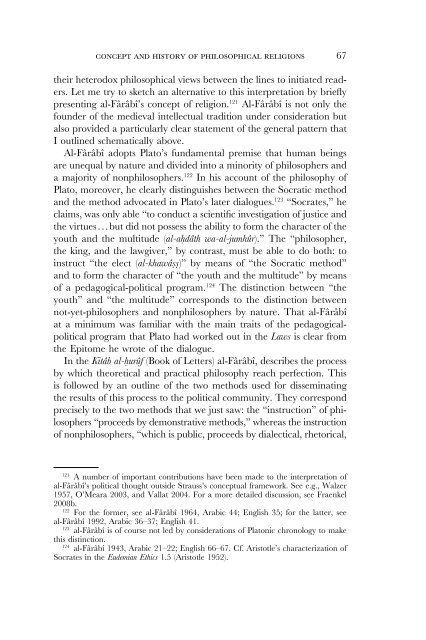Download PDF - Carlos F. Fraenkel
Download PDF - Carlos F. Fraenkel
Download PDF - Carlos F. Fraenkel
Create successful ePaper yourself
Turn your PDF publications into a flip-book with our unique Google optimized e-Paper software.
concept and history of philosophical religions 67their heterodox philosophical views between the lines to initiated readers.Let me try to sketch an alternative to this interpretation by brieflypresenting al-Fârâbî’s concept of religion. 121 Al-Fârâbî is not only thefounder of the medieval intellectual tradition under consideration butalso provided a particularly clear statement of the general pattern thatI outlined schematically above.Al-Fârâbî adopts Plato’s fundamental premise that human beingsare unequal by nature and divided into a minority of philosophers anda majority of nonphilosophers. 122 In his account of the philosophy ofPlato, moreover, he clearly distinguishes between the Socratic methodand the method advocated in Plato’s later dialogues. 123 “Socrates,” heclaims, was only able “to conduct a scientific investigation of justice andthe virtues . . . but did not possess the ability to form the character of theyouth and the multitude (al-adâth wa-al-jumhûr).” The “philosopher,the king, and the lawgiver,” by contrast, must be able to do both: toinstruct “the elect (al-khawâ)” by means of “the Socratic method”and to form the character of “the youth and the multitude” by meansof a pedagogical-political program. 124 The distinction between “theyouth” and “the multitude” corresponds to the distinction betweennot-yet-philosophers and nonphilosophers by nature. That al-Fârâbîat a minimum was familiar with the main traits of the pedagogicalpoliticalprogram that Plato had worked out in the Laws is clear fromthe Epitome he wrote of the dialogue.In the Kitâb al-urûf (Book of Letters) al-Fârâbî, describes the processby which theoretical and practical philosophy reach perfection. Thisis followed by an outline of the two methods used for disseminatingthe results of this process to the political community. They correspondprecisely to the two methods that we just saw: the “instruction” of philosophers“proceeds by demonstrative methods,” whereas the instructionof nonphilosophers, “which is public, proceeds by dialectical, rhetorical,121A number of important contributions have been made to the interpretation ofal-Fârâbî’s political thought outside Strauss’s conceptual framework. See e.g., Walzer1957, O’Meara 2003, and Vallat 2004. For a more detailed discussion, see <strong>Fraenkel</strong>2008b.122For the former, see al-Fârâbî 1964, Arabic 44; English 35; for the latter, seeal-Fârâbî 1992, Arabic 36–37; English 41.123al-Fârâbî is of course not led by considerations of Platonic chronology to makethis distinction.124al-Fârâbî 1943, Arabic 21–22; English 66–67. Cf. Aristotle’s characterization ofSocrates in the Eudemian Ethics 1.5 (Aristotle 1952).



